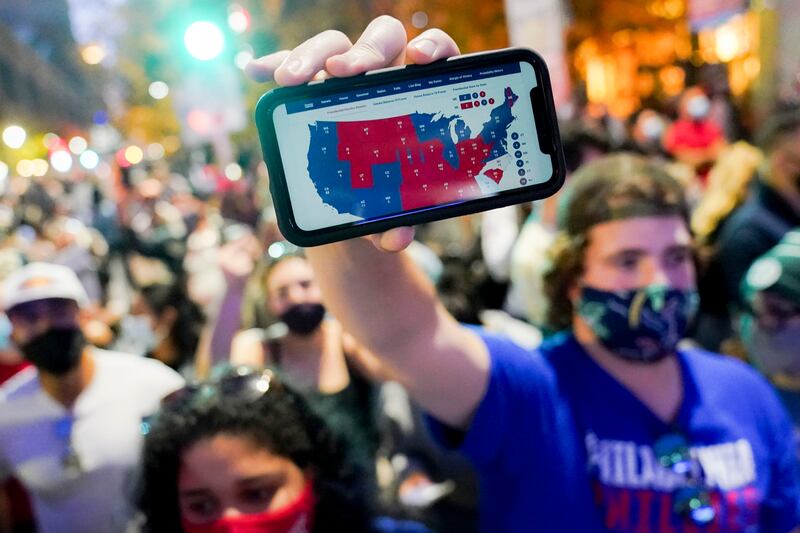A week from Monday, on Dec. 14, Utah’s designated electors will meet at the state Capitol to cast their ballots for president and vice president. Electors in 49 other states will do likewise, and determine the next president of the United States.
This ritual is often routine but becomes more controversial when one candidate wins the popular vote and the opponent wins the Electoral College vote. This year, Joe Biden is the apparent winner of both, so there will be less angst. We examine the implications of this constitutional institution and the election on Utah politics.
Once again, politicos are discussing whether the Electoral College should be preserved, modified or eliminated. Does Utah have anything at stake in this debate?
Pignanelli: ”The Electoral College is a political wisdom tooth — a historical relic that stays largely out of sight yet causes no small pain when it pops up.” — Matthew Daneman
Like the recent Utah-USC football game, the Electoral College proves the law of unintended consequences. The institution has evolved beyond recognition from the founders’ original intent of a group of select citizens deliberating in a thoughtful process — as described by Alexander Hamilton in “Federalist No. 68.” The existing “winner-takes-all” method is warping presidential elections as campaigns spend billions targeted on a few battleground states. But status quo advocates contend a national presidential election is fraught with danger. A compromise is in order.
Maine and Nebraska provide two electors for the statewide winner, and the remaining vote based on results in each congressional district. Because this substantially resolves current disadvantages, some politicos are advocating for a countrywide adoption. Electoralvotemap.com applied this system to contests since 2000 and concluded margins would have varied but with the similar ultimate results … except Mitt Romney was elected in 2012 and possibly finishing a second term this year.
Utah is among several states with minimal voting power in national elections. The Maine/Nebraska modification protects any small state advantage while forcing candidates to moderate and focus attention on regions currently ignored.
Politics and football demonstrate on a daily basis that plans are usually thwarted and modifications required.
Webb: We are a nation of states, not just a population mass. States created the federal government and have important rights under the Constitution. The founders instituted the Electoral College to help ensure that all states have meaningful roles in the federal system, including small states like Utah.
If presidential elections were decided by the popular vote, candidates would mostly campaign where the votes are — in the big cities and on the coasts. Instead of campaigning state-by-state, addressing the priorities and needs of individual states, campaign strategists would divide the masses into demographic and interest groups and would campaign to those groups with targeted messages. Democrats would spend immense amounts of money running up big vote totals in New York and California. You wouldn’t have candidates spending much time and money in small swing states like Nevada and New Mexico.
The Electoral College forces candidates to be aware of the priorities and needs of states, not just large demographic groups. If we care about states, if we care about federalism, we must preserve the Electoral College.
President Donald Trump and his legal team are working feverishly to change the predicted election outcome when electors gather in eight days. Will he be successful, and how does this pursuit play in Utah?
Pignanelli: Both sides are declaring the republic is in jeopardy either because of voter fraud or attacks on the election process. This is nonsense. Americans and Utahns turned out in record numbers to vote. The courts and the Department of Justice are hearing, then rejecting, unproven allegations of misconduct. Utahns moved on because the system is working.
Webb: Biden will win, but Trump has every right to pursue administrative and legal recourse to be certain the election was conducted properly. But it should be done with dignity and a willingness to concede gracefully when remedies are exhausted. Trump’s over-the-top rhetoric about the election being fraudulent and stolen goes too far. He is making it hard even for his strong supporters to hang with him.
How did President-elect Joseph Biden win the most votes in presidential election history, yet have such short coattails in down-ballot races?
Pignanelli: Trump’s campaign advisers tried hard to paint the election as a choice between a successful president and a compromise candidate beholden to left-wing interests. But many voters turned out to reject the incumbent’s style and not for the challenger. Thus, the unexpected results in congressional elections.
Webb: Hardcore Trump supporters are citing the coattails issue and other turnout statistics as evidence that Trump couldn’t have lost the election. But the reality is simple: Millions more voters than usual voted for Trump. But even more millions than usual voted against him.
The election was more of a personal repudiation of Trump, and was not a rejection of other Republicans, conservatism or even Trump’s policies. Voters were happy to support Republicans and conservative principles up and down the ballot. But while a lot of voters loved Trump, even more hated him.
Republican LaVarr Webb is a political consultant and lobbyist. Email: lwebb@exoro.com. Frank Pignanelli is a Salt Lake attorney, lobbyist and political adviser who served as a Democrat in the Utah state Legislature. Email: frankp@xmission.com.

